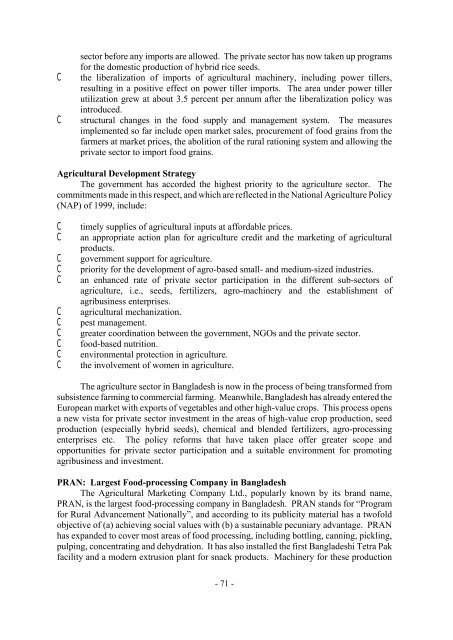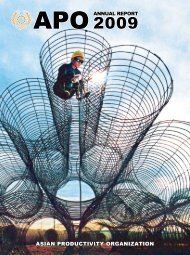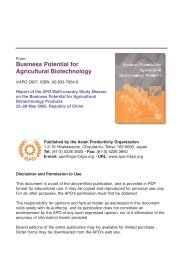Development of Agribusiness Enterprises - Asian Productivity ...
Development of Agribusiness Enterprises - Asian Productivity ...
Development of Agribusiness Enterprises - Asian Productivity ...
Create successful ePaper yourself
Turn your PDF publications into a flip-book with our unique Google optimized e-Paper software.
sector before any imports are allowed. The private sector has now taken up programs<br />
for the domestic production <strong>of</strong> hybrid rice seeds.<br />
C the liberalization <strong>of</strong> imports <strong>of</strong> agricultural machinery, including power tillers,<br />
resulting in a positive effect on power tiller imports. The area under power tiller<br />
utilization grew at about 3.5 percent per annum after the liberalization policy was<br />
introduced.<br />
C structural changes in the food supply and management system. The measures<br />
implemented so far include open market sales, procurement <strong>of</strong> food grains from the<br />
farmers at market prices, the abolition <strong>of</strong> the rural rationing system and allowing the<br />
private sector to import food grains.<br />
Agricultural <strong>Development</strong> Strategy<br />
The government has accorded the highest priority to the agriculture sector. The<br />
commitments made in this respect, and which are reflected in the National Agriculture Policy<br />
(NAP) <strong>of</strong> 1999, include:<br />
C timely supplies <strong>of</strong> agricultural inputs at affordable prices.<br />
C an appropriate action plan for agriculture credit and the marketing <strong>of</strong> agricultural<br />
products.<br />
C government support for agriculture.<br />
C priority for the development <strong>of</strong> agro-based small- and medium-sized industries.<br />
C an enhanced rate <strong>of</strong> private sector participation in the different sub-sectors <strong>of</strong><br />
agriculture, i.e., seeds, fertilizers, agro-machinery and the establishment <strong>of</strong><br />
agribusiness enterprises.<br />
C agricultural mechanization.<br />
C pest management.<br />
C greater coordination between the government, NGOs and the private sector.<br />
C food-based nutrition.<br />
C environmental protection in agriculture.<br />
C the involvement <strong>of</strong> women in agriculture.<br />
The agriculture sector in Bangladesh is now in the process <strong>of</strong> being transformed from<br />
subsistence farming to commercial farming. Meanwhile, Bangladesh has already entered the<br />
European market with exports <strong>of</strong> vegetables and other high-value crops. This process opens<br />
a new vista for private sector investment in the areas <strong>of</strong> high-value crop production, seed<br />
production (especially hybrid seeds), chemical and blended fertilizers, agro-processing<br />
enterprises etc. The policy reforms that have taken place <strong>of</strong>fer greater scope and<br />
opportunities for private sector participation and a suitable environment for promoting<br />
agribusiness and investment.<br />
PRAN: Largest Food-processing Company in Bangladesh<br />
The Agricultural Marketing Company Ltd., popularly known by its brand name,<br />
PRAN, is the largest food-processing company in Bangladesh. PRAN stands for “Program<br />
for Rural Advancement Nationally”, and according to its publicity material has a tw<strong>of</strong>old<br />
objective <strong>of</strong> (a) achieving social values with (b) a sustainable pecuniary advantage. PRAN<br />
has expanded to cover most areas <strong>of</strong> food processing, including bottling, canning, pickling,<br />
pulping, concentrating and dehydration. It has also installed the first Bangladeshi Tetra Pak<br />
facility and a modern extrusion plant for snack products. Machinery for these production<br />
- 71 -
















